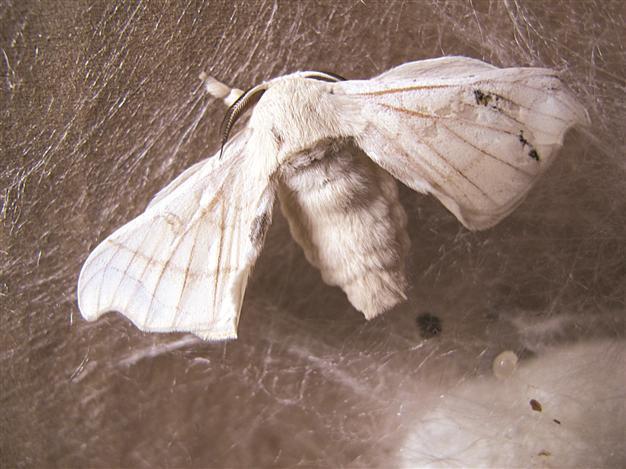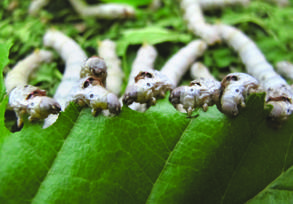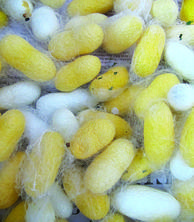Silkworms in the dining room
Wilco van Herpen

All the worms change into beautiful white and yellow cocoons. This is generally the time that silkworm producers collect the cocoons and boil them to get one long thread of pure silk.
As you might know, once upon a time, Bursa used to be the center of silk production in Turkey. Well, I have news for you: Soon there might be a new center for silk, silkworms and silk butterflies. That center will be Istanbul, and to be more specific, Zekeriyaköy.How I know? I have been witness to a new project. It started a year ago. My wife, Gonca, went to İzmir for a couple of days and when she came back, she brought with her 17 silkworms. As a child she used to take care of silkworms and watch them grow. Seeing silkworms at a market in İzmir, she could not resist the urge to buy them again. It was nice to watch the whole process and finally all that was left were some eggs. That was last year.
Little eggs suddenly hatch
Winter was over and with the sun shining a bit longer and a bit warmer, day by day the trees slowly wake up. It starts with a small green little pimple that grows and grows. Then, suddenly, it is as if it pops open and changes into a leaf. The leaf grows day by day and while those leaves are growing, something else is happening as well. Some of the little eggs in the box suddenly hatch and a tiny little worm starts to look for food. When I say tiny, I literally mean tiny; the worms coming out of their eggs are definitely not bigger than a millimeter. Hungry for food and eager to grow, they literally attacked the first mulberry leaf put in the box.
 The little worms grow fast, faster than the leaves on our little mulberry tree. Fortunately, there was another tree on our street and we started picking the leaves off that tree. But the eggs kept on hatching and more and more little worms were occupying the space in the little box. One box became two, three, four and in the end there were five boxes in our dining room.
The little worms grow fast, faster than the leaves on our little mulberry tree. Fortunately, there was another tree on our street and we started picking the leaves off that tree. But the eggs kept on hatching and more and more little worms were occupying the space in the little box. One box became two, three, four and in the end there were five boxes in our dining room. Unfortunately, the leaves of the tree that we used to pick the leaves from did not grow fast enough, so we had to find more mulberry trees. In our village in front of a big supermarket, the municipality had planted seven or eight mulberry trees so this became our last hope. Every day, in the morning and in the evening I used to go to the supermarket and pick the leaves. Once I filled a plastic bag I knew I would have enough for another 12 hours. The funny thing is that nobody even once asked me what I was doing with all those leaves. Slowly the trees in front of the supermarket started to have bare branches again, it was obvious that the tree could not produce enough leaves to replace the leaves that I used to feed those hungry creatures. We started giving the worms away to friends, telling everybody how nice and educational it would be for their children to see the circle of life. This is how we managed to get rid of at least 400 or maybe more worms. But we still had thousands of them.
The worms grew and grew and then, one day, one of the worms climbed up into a corner of one of the boxes and slowly started to make its cocoon. I was excited and very happy: finally the leaf-picking activity would come to an end. But my happiness did not last long. It took at least four more weeks before all the worms changed into beautiful white and yellow cocoons. This is generally the time that silkworm producers collect the cocoons and boil them to get one long thread of pure silk, but we decided to wait until the cocoons opened up at one side. The butterflies managed to make small, perfect, round holes in their cocoons before escaping.
A beautiful white butterfly gets out of the cocoon and starts buzzing around. This silk butterfly is not much of a flyer; it can just jump up a bit. This jumping up is enough for him (or her) to move around and find a partner to reproduce with.
 A strange sound
A strange soundHundreds of butterflies were flapping their wings and making a strange sound. The first time I heard this sound I did not know what was happening; it was a scary sound as if I was in a cave filled with hundreds of bats, but then the sound was not as loud as the sound of bats.
Anyway, all the butterflies laid their eggs and every day I removed more and more dead butterflies.
Their life cycle had come to an end. Now we have to wait for next year when we will have thousands of eggs that will hatch, change slowly into butterflies and produce tens of thousands or maybe even hundreds of thousands of new eggs. If there is anybody who wants to give me a big mulberry tree forest I might consider encouraging my wife to continue her hobby. If not, I will be forced to get rid of most of the eggs.
So people, with this column I warn you. Seeing the whole process of a tiny egg transforming into a butterfly is nice but take care that at the end you get rid of the thousands of eggs.
















